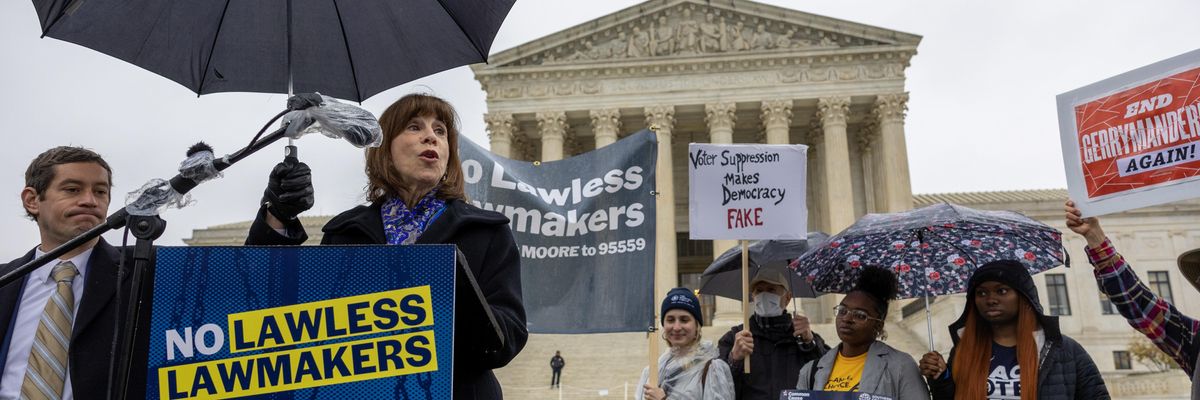Sometimes I feel like screaming at the mainstream media for failing to alert people to crucial (although complicated) issues affecting our democracy coming from different parts of government simultaneously.
Case in point: Moore v. Harper, argued Wednesday before the Supreme Court, and the Electoral Reform Act, which must be enacted before the end of this Congress because Republicans won't touch it once they control the House.
If the media doesn't adequately report on issues like this, how can a free people govern themselves to begin with?
The two are intimately connected but you wouldn't know that from the mainstream media, which is treating them as two separate stories. Let me make the connection.
In Moore, North Carolina Republicans aim to restore a redistricting map drawn by the GOP-led legislature but rejected as violating the state constitution by North Carolina's supreme court.
North Carolina bases its argument on the bonkers "independent state legislature" theory, which interprets Article I Section 4 of the U.S. Constitution (authorizing state legislatures to prescribe "the times, places and manner of holding elections") to give state legislatures sole authority over elections, without interference from state courts.
The theory sprang from the head of Justice William Rehnquist in 2000, who wrote (in a concurring opinion in Bush v. Gore) that "the text of the election law itself, and not just its interpretation by the courts of the States, takes on independent significance."
Since then, Brett Kavanaugh, Samuel Alito, Clarence Thomas, and Neil Gorsuch have all endorsed aspects of the theory. Notably, they didn't disavow it in Wednesday's oral argument.
Not only would the theory open the door to extreme gerrymandering, allowing one party to virtually entrench itself in a state. It could also allow state legislatures to reject the results of a presidential election.
Which is where the Electoral Reform Act, now before Congress, comes in.
Article II of the Constitution requires states to appoint presidential electors "in such manner as the Legislature thereof may direct." And the Electoral Count Act of 1845 allows state legislatures to choose a new manner of appointing the state's electors if the vote for the presidency has "failed" in the state.
But what does "failed" mean and who has the authority to declare a failure?
This wasn't an issue until the 2020 election, when Donald Trump exploited the Act's vagueness to claim he could overturn the will of the voters.
He pushed state legislatures to appoint electors for him regardless of the popular vote. (Fortunately, they refused.) He pressured congressional Republicans to object to Joe Biden's electors. (Trump partly succeeded, but not by enough to throw the election his way.) And he pushed Vice President Pence to illegally delay the electoral count so Trump could continue pressuring states. (Thankfully, Pence refused.)
American democracy survived by a whisker. But add in a Supreme Court ruling affirming the independent state legislature theory, and what do you get if Trump (or any other anti-democracy candidate) tries the same thing again? A democratic disaster.
This isn't wild conjecture. Just weeks ago, after Arizona gubernatorial candidate Kari Lake contested her loss based on absolutely nothing, the election board in GOP-controlled Cochise County refused to certify the results.
Eventually Cochise came around. But in a future presidential election, a GOP-controlled state legislature--armed with a broad "independent state legislature" theory from Moore v. Harper--could seize on this kind of resistance to declare a "failed" election and appoint a slate of fake electors. And neither Congress nor a Vice President could stop them. This time, democracy wouldn't survive.
Which is why the Electoral Reform Act--now before Congress--is so important.
It would require state legislatures to appoint presidential electors exactly as they've been appointed before. So if a state's laws require that electors certify the person who has won the popular vote, a legislature can't use the "failed" election loophole to appoint electors for anyone else.
Other provisions require that governors certify the correct electors by a hard deadline before Congress counts them, and allow an aggrieved candidate to trigger expedited judicial review.
Where is the Electoral Reform Act at this point?
Ten Republican senators tentatively support it but Trumpsters are pressuring them to withdraw their support.
With so little time remaining in the lame-duck session, the measure may be attached to the end-of-year spending bill.
But how many close calls like this can a system of self-government endure?
And if the media doesn't adequately report on issues like this, how can a free people govern themselves to begin with?
